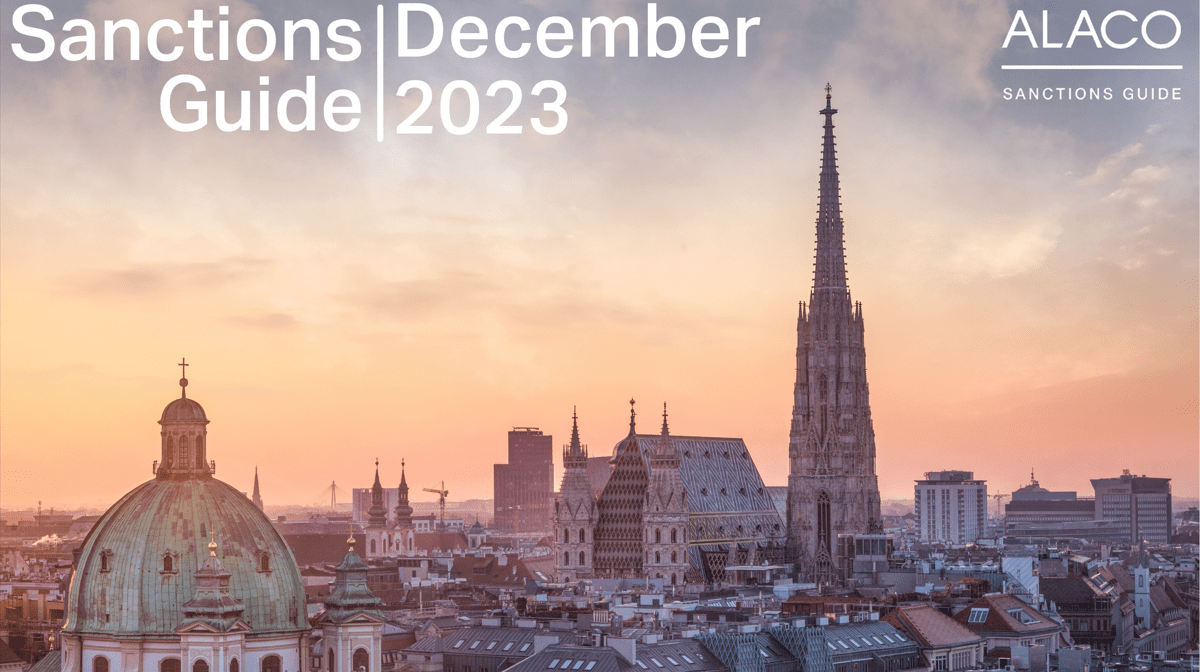November saw the arrival of another wave of Russia-related developments with OFAC announcing a raft of over 100 new designations, as well as details emerging of the proposed 12th package of Russia sanctions developed by the EU Commission.
In the enforcement space, US authorities continue to crack down on those breaching its Russia-related measures, with a particular focus on payment processors. Outside of Russia, OFAC announced further measures in respect of Hamas, as well as of officials in Guatemala, Colombia and Iran.
In Europe, The General Court of the EU rejected Nikita Mazepin’s application for the annulment of his designation.
Russia Measures
- This month, the EU Commission submitted to the Council a proposal for the 12th package of Russia sanctions. The new measures propose the designation of over 120 individuals and entities, including actors in the Russian military, defence, and IT sectors, and “other economic operators”, new import and export bans (reportedly on diamonds, LPG, and metals), and the tightening of the oil price cap.
- On 2nd November, OFAC designated over 100 individuals & entities involved in Russia’s energy production, the metals and mining sector, defence procurement, and those involved in supporting the war effort, mostly based in Russia, but also including notable examples in Luxembourg and Singapore. Later in the month, OFAC further designated entities and individuals in countries including China, Turkey and the UAE who have been alleged involved in sending dual-use goods to Russia, including “high priority goods”.
Enforcement
- On 1st November, a criminal complaint was unsealed in Brooklyn, USA, charging Nikolay Goltsev, Salimdzhon Nasriddinov, and Kristina Puzyreva with conspiracy and other charges related to a global procurement scheme on behalf of designated Russian entities, including companies affiliated with the Russian military. The three individuals are alleged to have illegally exported millions of dollars’ worth of electronics from US manufacturers to Russia through various intermediaries located in Turkey, Hong Kong, India, China, and the UAE, in violation of US sanctions and export controls.
- On 2nd November 2023, the New York State Department of Financial Services (NYSDFS) imposed a penalty of $1.25 million against Payoneer Inc, a New York-based provider of online money transfer and digital payment services. NYSDFS found that Payoneer had processed a payment to a bank in the Crimea region of Ukraine. Payoneer made a Voluntary Self-Disclosure to OFAC and took remedial actions to correct technical problems in its OFAC compliance system. The NYSDFS penalty is on top of a separate $1.4 million penalty imposed by OFAC in July 2021 for Payoneer’s processing of commercial transactions for parties located in multiple regions subject to US sanctions, including Crimea, Iran, Sudan and Syria, and 19 payments on behalf of designated people.
- OFAC has announced a settlement agreement with Illinois-based payment processor, DaVinci Payments; DaVinci agreed to pay a penalty of $206,213 to settle its potential civil liability for apparent violations of sanctions on Crimea, Iran, Syria, and Cuba. Between 2017 and 2022, DaVinci enabled reward cards to be redeemed from persons in these sanctioned jurisdictions.
- This month, the General Court of the EU rejected an application by Belarussian businessman Dimitry Mazepin (father of F1 driver Nikita) for the annulment of his sanctions designation. Mazepin was listed by the EU Council on 9 March 2022 for being the owner and CEO of Uralchem and for attending a meeting with President Putin and other businesspersons on 24 February 2022. The court said the EU was entitled to conclude that Mazepin was involved in economic sectors providing a substantial source of revenue to the Russian Government and was supporting actions or policies which undermine the sovereignty of Ukraine. It confirmed that it is the economic sector, rather than the person, which holds relevance as a substantial source of revenue to the Russian Government, and the fertiliser sector, in which Mazepin operated, satisfied this condition.
Other Designations
- The US House of Representatives has passed the Hamas International Financing Prevention Act, which is now being debated by the US Senate. If passed by the Senate, it will then be sent to the President for consideration. The US has already proscribed Hamas and Palestine Islamic Jihad as terrorist organisations and current legislation enables the US to impose sanctions on them. The proposed bill provides more direct authority for the US to impose sanctions on foreign supporters of Hamas and Palestinian Islamic Jihad, including foreign governments. Additionally, OFAC announced its third round of sanctions targeting Hamas-affiliated individuals and entities since the October 7 attacks. This action designates Hamas officials and the mechanisms by which Iran allegedly provides support to Hamas and Palestinian Islamic Jihad (PIJ).
- On 1st November, The US Department of State designated three Guatemalan public officials for allegedly accepting bribes in exchange for their performance of their public functions during their tenures, as well as 13 Sinaloa Cartel members in Mexico.
- The US Department of State has designated former Colombian General Jésus Armando Arias Cabrales due to his alleged involvement in a gross violation of human rights during the retaking of the Palace of Justice of Bogotá in November 1985. As a result, Arias Cabrales and his wife and children are ineligible for entry into the United States.


